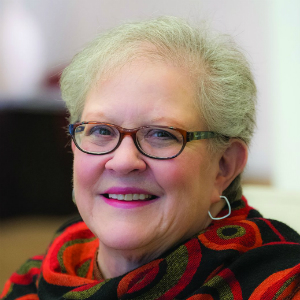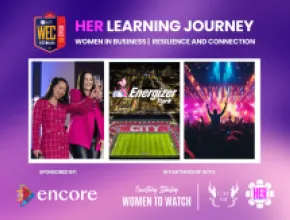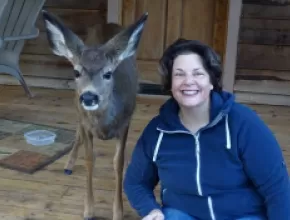What others read delivers insights into their thinking and provides a guideline for what we may want to read. This can be especially relevant for those in our own industry, such as meeting and event planners and other hospitality industry professionals.
In the related July 2019 Friday With Joan blog post accompanying the answers to my questions below, I wrote about my own reading. In addition to asking colleagues, I asked three authors to respond: Thrity Umrigar, an author whose books have entranced and moved me, and Matthew Reimer and Leighton Brown, neighbors and friends who recently published We Are Everywhere: Protest, Power and Pride in the History of Queer Liberation.
They all have written books to help us understand culture as well as empathize with others. To them, and to my colleagues, I am grateful.
Check out the books at the Meetings Today Bookstore for reads that may help with your professional development and planning meetings. We hope to add to the offerings.
The questions below were sent a variety of people. Included are those who were able to take the time to respond. My immense gratitude goes out to each of them. If in editing, we have changed the intent of what they wrote, it’s on us and we apologize.
Respondents are listed in alphabetical order by first name. Contact information is provided at each individual’s discretion.
Beth Cooper-Zobott (Beth)
Director, Conference Services, Equity Residential, Chicago
bcooperzobott@gmail.com
Deborah Gardner, CMP (Deborah)
President of DG International, LLC, Founder & Researcher for Meetings Talk
Ambassador for Meetings Mean Business, Phoenix
www.DeborahGardner.com
Emily Mathews, CMP (Emily)
Owner, Event Management Professionals, Round Rock, Texas
emat1971@austin.rr.com
Janet Sperstad, CMP (Janet)
Program Director, Event Management, Madison College, Madison, Wisconsin
Jeff Hurt (Jeff)
Chief Epiphany Officer, Empowered Epiphanies, Dallas
jeffLhurt@gmail.com
Keith Levey (Keith)
Explore St. Louis, St. Louis
Kristin Lamoureux, Ph.d. (Kristin L.)
Visiting Professor of Hospitality and Tourism Management, Virginia Tech University
kristinl@vt.edu
Kristin McGrath (Kristin McG.)
Vice President of Sales, Services & Sports, Visit Albuquerque
mcgrath@visitabq.org
Susan R. Klemmer (Susan)
Consultant, freelance editor and writer, Washington, D.C. (suburban Virginia)
klemmersr@gmail.com
Zoe Moore (Zoe)
Founder/CEO, LB Alliance, CDP, Oakland, California
Email: info@lotusbaseline.com Website: www.lotusbaseline.com
Q1. What are the one or two books (titles and authors) you think everyone in hospitality should read, and why?
Beth: Any type of culinary dictionary; could be LaRousse Gastronomique, The Chef’s Companion or any other. It’s my go-to again and again when I am menu planning. Sometimes menus are so complex, or so technical, that I need a dictionary to translate a cooking style, an ingredient or a type of cuisine, especially when I am sharing menus with others for approval.
The book that I use/recommend is The New Food Lover's Companion-Comprehensive Definitions of Nearly 6,000 Food, Drink and Culinary Terms, Third Edition, by Sharon Tyler Herbst. It's also known as the Barron's Cooking Guide.
For example, my culinary dictionary lists “Pasta” as a header, and then lists every type of pasta known to man, along with a description of its flavor, appearance, country of origin and suggestions for sauces to go with it. A good culinary dictionary is indispensable.
Deborah: Be the Best at What Matters Most, by my good friend Joe Calloway. Reading this amazing book, I found that it’s not about working hard or smart, it’s about what you do best, simply and sustainably. Reading this great book allowed me to refocus my business strategy to be as basic as possible.
Emily: I just love Martin Yate. He writes all these job search and career and interviewing books, and they really stand out. He gives webinars sometimes, too. I think they’re free.
There’s also a book with the most intriguing title I’ve ever seen: Never Check E-Mail in the Morning, by Julie Morgenstern. Isn’t that unthinkable? Don’t you want to run out and read it? I gave it as a thank you to a client who is totally drowning in email.
I actually read Morgenstern’s Organizing From the Inside Out. Now, there are thousands of such books, but something in hers actually stayed with me for life: “Dance close to the revenue line.”
What she meant is, when prioritizing, tackle the money-making items first. Of course, many of us work for nonprofits, but I never worked for one that didn’t want or need money in the coffers. So, sell those sponsorships first! Make conference reminder calls first! Dance close to that revenue line!
Janet: While you say “hospitality,” I don’t identify as being in that industry, nor does that include event management. So, let me take the liberty to rephrase it: “What book do I recommend for event professionals to be inspired by?” Therefore, I recommend John Medina’s Brain Rules. John was the first person to inspire me and make connections about the power of neuroscience to our world of event management. It’s an easy, digestible read that you can put down and pick up anywhere in the book.
[Joan’s note: I had more questions of Janet about “hospitality” vs “meetings and events.” Schedules leading to publication did not permit our taking this another step. We will and more will be provided.]
Jeff: Outcomes Over Output: Why Customer Behavior Is the Key Metric for Business Success by Joshua Seiden is one of the books I’m currently reading, re-reading, pondering and reflecting on as applied to conferences, events and meetings.
As meeting professionals, we often get caught up with vanity metrics like attendance, number of sponsors and satisfaction rates instead of the metrics that matter. This book discusses how customers are at the center of what we do and to focus on meeting outcomes that change our customer behaviors.
Those outcomes should be the things our customers seek, want and need. Then we find ways to deliver them during our event.
A book that I read a couple of years ago and find myself continually turning to is Make Your Brain Smarter: Increase Your Brain's Creativity, Energy, and Focus, by Dr. Sandra Bond Chapman.
It contains daily exercises we should practice to create healthier, stronger and more resilient brains. In addition to this daily mental fitness regime, it provides the research and science of why we need to be operating from our frontal lobes instead of our routine, rote and emotions.
Chapman shares why need to become transformative thinkers practicing innovation, creativity and integrated reasoning. Her insights easily transfer to making our meetings more effective and transformative instead of just memorably wow-like. I’ve had the pleasure of personally meeting and learning from Dr. Chapman and her research team at the University of Texas-Dallas Center for BrainHealth and the Brain Performance Institute. Her insights are game changers for our industry.
Keith: A Fine Balance, by Rohinton Mistry
Kristin L.: Anything by Anthony Bourdain, but especially A Cook's Tour. I very much appreciated his approach to travel and the role that travel and food have in bringing people together.
He was not interested in the shock value of eating strange foods just to showcase them on TV like some of the other food shows did. He was most interested in showcasing food in the context of the culture and the people and the fabric of the place from which it came. His medium was food, to facilitate sharing and educating the rest of us about all of the far-flung corners of the world that he was able to visit.
I became interested in travel as a career because I got to travel and understand the incredible power that travel has. The act of sitting at a table and breaking bread and talking to someone from a culture that's completely different than your own is incredibly powerful. It's something we need more of in today's world.
Although I wouldn't recommend this to my students, I do think the book Heads in Beds: A Reckless Memoir is something that hospitality professionals should at least take a look at. It's a bit off-color and probably showcases a portion of our labor force that we’re not necessarily proud of, but it does speak to the reality of those in the front lines in hotels in some cases. I'm not saying that everything across the board is like this, but it's an interesting perspective that's worth looking at, especially if you're in a leadership role.
Lastly, as I’ve been working to develop Virginia Tech's new professional certificate in privacy and security for event professionals, I've spent a lot of time this year looking at cybersecurity and data management. I don't have any one book to recommend, but I think are people in our field need to be at least aware of the potential threats that are out there with regard to technology and cybersecurity, and all of the innovations that are coming on board very quickly.
Kristin McG.: The first semester of my freshman year in college I was required to read Dr. Martin Luther King Jr.’s Letter From a Birmingham Jail for a persuasive composition class. While it isn’t a book, it is an important piece of literature that I make a point of reading every January. It is a beautifully composed work with a message that is still relevant 56 years after it was written. Dr. King’s thoughts on “tension” and tension being necessary for growth have impacted both my personal and professional life.
I am a natural optimist who also happens to be a reality-based member of Gen X. Barbara Ehrenreich’s 2009 book Bright-Sided: How the Relentless Promotion of Positive Thinking Has Undermined America really resonated with me. It’s been a decade since I’ve read it, but the theme has stuck with me. While a good attitude is important, positive thoughts can’t “fix” everything. Hard work, grit, perseverance and the ability to deal with disappointment and setbacks are necessary, too. And sometimes all those things just leave you exhausted, but it is okay to acknowledge that.
Susan: Wolfpack, by Abby Wambach, because it’s succinct, usable, relatable and occasionally raw. It’s a quick read and a useful re-read.
Delivering Happiness: A Path to Profits, Passion, and Purpose, by Tony Hsieh, is good for anyone in business, but especially for those who believe their careers must also match their passions.
Zoe: Purpose Economy, by Aaron Hurst. This book addresses the emerging type of entrepreneurs that are purpose- and sharing-driven with businesses focusing on people over profit. I refer to it for inspiration to help strengthen my business model, which advocates for others to succeed.
Outliers, by Malcolm Gladwell. The author takes an interesting look into privilege by breaking it down to context and conditions. Instead of perpetuating success as a result of dedication, Gladwell uses insight into how data can help us understand anomalies.
Q2. For pleasure, what are your favorite author(s) and/or genre(s) and why?
Beth: I enjoy historical fiction. Books in that genre that I’ve read and enjoyed most recently are The Huntress, by Kate Quinn; The Tattooist of Auschwitz, by Heather Morris; The Lost Girls of Paris, by Pam Jenoff; and The Paris Architect, by Charles Belfoure.
Deborah: Willie Nelson, It’s a Long Story. An American music icon, who at 80 years old still tours constantly and headlines music festivals, winning the hearts of fans all over the world. Hearing about all aspects of his life, including his drive to write music, the women in his life, bankruptcy to the founding of Farm Aid, just solidifies that no matter if you are a celebrity, rich or poor, we all go through the same thing.
Emily: With one exception, I’m 100 percent a non-fiction reader, especially fun, female writers like Suze Orman’s writing on personal finance. Lean-In, Girl, Wash Your Face, by Rachel Hollis, is also among my favorites.
My one fiction hero, may he rest in peace, was Dominick Dunne. I can’t describe how his writing moved me. He mainly wrote fiction about how the wealthy people of New York and Los Angeles literally and figuratively get away with murder. An Inconvenient Woman and People Like Us are both great books. Mr. Dunne actually lived in that world. He was a movie producer, and his daughter [who was murdered] was the older sister in the movie Poltergeist.
Writing about these people, and supporting real-life victims, was how he healed. His non-fiction could have been gossipy and shallow, but it wasn’t. He wrote hauntingly and with depth and clarity about the Brown family, the Menendez brothers’ infamous curly-haired lawyer and the Claus and Sunny Von Bulow case. He was always on the victims’ side. The Mansions of Limbo is a breathtaking collection of his essays. I once wrote to him through his publisher, and he wrote back. I could tell it was really him.
Janet: Murder mysteries: My favorite authors are John Higgens, Brad Meltzer and Tana French. I’m currently reading C.J. Box. It allows me to escape and relax. I always try to figure out who did it and never do.
Jeff: I’ve been reading a lot of David Sibbet and Gisella Wendling’s books, such as Visual Meetings and Visual Leaders. I’ve also devoured the Visual Thinking: Empowering People and Organizations Through Visual Collaboration, by Willemien Brand.
Keith: Books set in and around WWII.
Kristin L.: I don't believe I have a favorite genre, although I have several that I do not like. For example, I've never been much into mysteries. I do prefer historical fiction as well as novels that portray strong women overcoming challenges.
Lately, I've also enjoyed reading some "pop" research novels, such as Malcolm Gladwell’s The Tipping Point. There's a lot of knowledge that exists in academic research that never hits the mainstream. While there are certainly flaws in some of these types of books, I do appreciate those that have been able to take their research and share it with a larger audience. I find particularly when I'm driving I can listen to them; it helps frame my own way of thinking.
Kristin McG: I read a lot of nonfiction. I really enjoy books by both investigative and political journalists. It was released a year ago, but over Memorial Day weekend I finally had time to read John Carreyrou’s Bad Blood: Secrets and Lies in a Silicon Valley Startup. It is a great book. I’ve spent time thinking about the importance of substance over hype and the huge role public relations plays into perceived success.
Any book that is described as basically a super long Vanity Fair article typically gets my attention.
Susan: Author Deborah Coonts; all of the books in the “Lucky” series (mystery/crime). Complicated crime scenarios, excellent hospitality industry perspective (I just realized that this is a large part of why I love these books!) and a lead with real life family and romantic issues.
Author Diana Gabaldon; all of the Outlander series. Amazingly accurate historical details, time travel and a beautiful soul-mate romance.
Author Glennon Doyle, for inspiration.
Author John Pavlovitz, for hope.
Zoe: Lion's Blood, by Steven Barnes: The author flips history and tells a narrative of Africans enslaving Europeans. The alternative story is told not to promote vengeance, but instead helps readers question the portrayal of history and society’s biases as a result of miseducation. This book is a guilty pleasure because I wonder what life would be like without the residuals of the transatlantic slave trade, and I believe it can help paint a clear picture for those who question the impact of centuries of injustice.
Q3. Any guilty-pleasure reading?
Beth: I collect vintage “malt shop” books. These are books from the 1940s, 1950s and 1960s, written for teenage girls. There are subgenres such as “Mystery” (think Trixie Belden, Dana Girls or Nancy Drew) and “Career Romance,” and the true malt shop books that are about life in high school—friendships and rivalries, sports, schoolwork, activities, family and dating.
I read these books as a teenager in the 1970s and 1980s (mostly library books), and they provide a lot of nostalgia and an escape for me. I usually read about a chapter before bed, and inevitably they allow me to immediately relax, decompress and fall asleep without stressing over a “to-do” list.
[Joan: Discover this related reading].
Deborah: People magazine. It makes me feel good that my life is not as dramatized as celebrity’s lifestyle. Plus, it’s a good laugh! Ha!
Emily: I’m a voracious reader of celebrity autobiographies, especially rock stars. Yes, the debauchery makes for a fun read, but mainly I’m fascinated by what makes the majority of these guys end up in rehab. It is not a coincidence. They serve to remind me that money and fame and adoration are absolutely far, far from a guarantee of happiness. Look at all the misery, and the miserable backgrounds they came from. They rise above their backgrounds, but to what? The Dirt by Motley Crue was made into a Netflix film. It’s not for the faint of heart, but I loved it! It reminds you that absolutely nobody in the world is immune from the pain of losing a child.
In particular, as far as autobiographies go, I am waiting on Axl Rose and Eddie Van Halen. Axl is busy on tour (I will see him in October) and Eddie never picks up a pen. Just a guitar!
Janet: No, because I often don’t feel guilty about how I spend my time.
Jeff: One of my guilty pleasures is reading children’s picture books, especially the year’s Caldecott Medal Winner and finalists. The variety of art used for illustrations is often mesmerizing and the stories are priceless. It’s my goal to eventually publish a children’s picture book that becomes a Caldecott Medal winner!
[Joan’s note: I’m with Jeff on this. In addition to loving these books for myself, they are wonderful gifts to give to children and adults.]
Keith: Reading My Way Of Life, by Miss Joan Crawford—no joke!
Kristin L.: I like Trevor Noah. I think his approach to comedy is very funny while still touching on some big topics like racism and politics.
Kristin McG: I recently read Ladies Who Punch, the Explosive Inside Story of The View, by Ramin Setoodeh. A well-reported celebrity scoop is my guilty pleasure. Setoodeh is the New York bureau chief for Variety.
Susan: I enjoy historical romance with good historical detail. I’m partial to Regency-era romances and series.
Q4. I prefer books…
…mainly in print (Deborah, Emily, Janet, Keith, Kristin McG.)
…mainly digitally (Susan, Beth)
…and/or I like listening to recorded books. (Emily: For long trips.)
Beth: I spend about two hours commuting a day, roundtrip, via train between the suburbs and Chicago, so I have a lot of time to read. I love e-books because they’re portable, and since I always have my phone on me (and usually my Kindle in my briefcase) it is easy and convenient to read. I also subscribe to multiple newspapers (Washington Post, The New York Times, Chicago Tribune, Boston Globe) and read a lot of news aggregators like Wake Up to Politics, by Gabe Fleisher, a 17-year-old kid who is a politics and news junkie who lives in suburban St. Louis; The Skimm, Fast Forward and “Good Morning,” from CNN.
Emily: Print. I love the smell and the feel.
Jeff: I enjoy books in both print and digital versions. I’ve found that my learning from those books is based on my thinking about their content and reflecting on how I might apply their concepts. I take copious notes when reading and see if I can restate the content in my own words.
I will also read a chapter in one book and then put it down and go to a chapter in another book that has nothing to do with the previous content. Then I try to find the connections and intersections of the two different topics or disciplines.
Kristin L.: I prefer to read in print, but the reality of travel is that normally I'm listening to it through audio or reading it on my phone. [Joan: I’m sure she meant that she stops to read on her phone, not drive and read!]
Kristin McG: I prefer books mainly in print because I love to read outside, and with physical books I don’t have to worry about sun glare bouncing off my iPad.
Q5. Any additional thoughts on books and reading?
Beth: I’ve been an avid reader ever since I learned to read. When I have completed a book and don’t have a new book on the horizon, I feel a little bit lost, like, “Where are my characters!?!?!?” That’s why I love my Kindle—I almost always have another book queued up and available to read.
Emily: I’m so, so glad that I love to read. It’s such an escape; something to get lost in. Don’t overlook your library! Mine always has the latest, miraculously checked in and ready for me to borrow.
Janet: Just do it! Reading expands the mind and fires neuron—that is so healthy for your brain. It ignites the brain in ways a movie and talking do not. Take care of your brain health like you do your body health and read!
Jeff: One other book that I highly recommend that has direct implications on our industry is Josh Packard’s Church Refugees: Sociologists Reveal Why People Are DONE With Church But Not Their Faith. Don’t let the title fool you. It’s based on research on why people no longer trust institutions like faith organizations, government and public education, and yet attend annual meetings. Packard is a sociologist that studies what groups of people do. Don’t miss his concept of “The Doners” and what we need to do to regain people’s trust.
Keith: Jean Harlow was quoted as saying, “Whatever you get me for Christmas, don’t buy me a book. I already own one.” [Joan’s note: I know Keith; I think he’d be happy to own another book.]
Kristin L.: As an academic, I do think there is reason to be concerned for the decline in reading, particularly with young people. Because of the cost of textbooks, it's difficult for me as an academic to assign a textbook for a class, especially when there's so much on the internet. However, I do try to assign a couple of smaller books throughout the semester. I think it's important for students to read an entire book as opposed to a series of readings throughout a semester. There is a sense of start to finish and a way to understand the whole story that we can gain from books.
Kristin McG.: Be good to yourself. Find time to read.
Susan: It’s important to read what interests you, but also what appalls you, what frightens you and what makes you think. I subscribe to the print edition of The Washington Post, Vanity Fair and Diabetes Forecast. All of them are important reads for me: educational, stimulating and informative. I also receive multiple freelance, hospitality, association, inspirational and health-related newsletters electronically on a daily schedule.
Zoe: I’m always determined to articulate my thoughts and challenge my comprehension. Reading has been a fundamental tool for these abilities. Too often, people engage in discourse without a supported and/or researched opinion. I believe that reading is the solution to many arguments that are derailed by emotions and not facts or clarity.
Related Content From the July 2019 Edition of Friday With Joan
- The Power of Reading Books: Life, Spirit and Knowledge Enhancement
- Thank Authors Who Have Made an Impact on Your Life
- What's Your Take? July 2019 FWJ Poll
Click here to view additional content in the 07.12.19 Friday With Joan newsletter.







